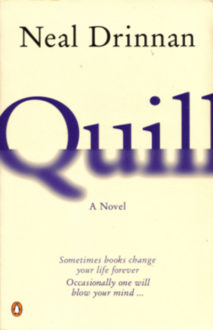 Quill
Quill
by Neal Drinnan
Published by St. Martin’s Press
Published February 10, 2001
Fiction (foreign)
240 pgs. • Find on Amazon.com
Reviewed by Stephen O. Murray
August 17, 2003.
Australian gay novelist Neal Drinnan (Glove Puppet) manages the difficult feat of having his cake and eating it, too.
In this particular extension of the metaphor, he finds a way to combine some pretentious melodramatic writing and contemptuous dismissals of overwriting and self-dramatization within the same book. His 2000 novel Quill has a mostly offstage Australian gay novel, Elliot Barnard, whose very graphic and very autobiographical writings are criticized and bemoaned by those who have been closest to him…with large chunks included and providing keys not only to the character of fictionalized and recollecting Elliot Barnard but into the characters of his once and future lover Blaise (fictionalized as Pascal an obvious transformation that eludes Blaise’s subsequent partner Woody, who does notice that his own character’s name, Wolfie, is not very different) and of his mother who is dreading reading Elliot’s autobiography and being frustrated in advance that he is, once again, going to have the last word.
The novel is divided into two parts, both of which are filled with flashbacks. Each has a Dorothy Parker quatrain so apt that I have to quote it. The first one, from “Reuben’s Children”) is:
Accursed from their birth they be
Who seek to find monogamy
Pursuing it from bed to bed—
I think they would be better dead.
The Parkerian hypocrite here is Woodrow who makes sanctimonious Andrew Sullivan-like prescriptions about monogamy, particularly to his cowed lover Blaise, with whom Woodrow began a relationship while Blaise was Elliot’s lover. Also like Sullivan, Woodrow does not practice what he preaches.
Woodrow has more reasons than just animus for his lover’s former partner to forbid Blaise not to read Elliot’s new novel, Je Louse. Each of them covertly does read the book, which is mined. There is an unmetaphorical explosion as well as the detonation of the one contained in Je Louse.
Some might think that Woody is exaggerated, but I have a friend in a relationship with someone more controlling, unreasonable, and hypocritical than Woody with very similarly internalized homophobia. Truth being stranger than fiction has kept me from writing about their relationship.
Both halves of the book explore the hurt of those whose experiences are appropriated by writers. Outrages are generally not about what is invented but about what is accurately transcribed from reality.
The second part begins with a “Thought for a Sunshiny Morning”:
It costs me never a stab nor squirm
To read by chance upon a worm.
“Aha, my little dear,” I say,
“Your clan will pay me back one day.”
The present of the second part is a post-funeral reception in what had been Elliot’s and Blaise’s apartment. The focus is on Elliot’s mother—or rather Berni’s, since he inverted the order of his given name Elliot Bernard. The occasion and the mementos of her dead son, particularly photos, make her reflect on the son she bore who never fit into the rural society in which they lived and was rejected by his more conventionally macho brother and the father who preferred that brother. Chunks of Elliot’s soon-to-be-published memoir alternate with discussions among mourners and Rose Elliot’s reveries.
Without the contrived digging of, say, Citizen Kane, Elliot’s life history emerges convincingly. He ultimately seems to have heroically been himself and his mother educates the survivors by shaking some of their smugness.
The ending is a bit pat, but the very curving road to it is entertaining as well as pointed. Although there is not much graphic sex in the book, there are allusions and invocations of the fervent pursuit of sexual pleasure that is part of why you can’t keep young gay men “down on the farm” when they’ve seen the bright lights and multiple kinds of freedom of the big city (the book is set mostly in Sydney, though Elliot is in New York for the first half of the book, and much of the second reaches back to the childhood and adolescence on a farm near Darlinghurst).
(Having vouched for the plausibility of Woodrow, I might also note that Rose seems very like a woman from Missouri I met whose son had some of the mordant Dorothy Parker wit of Elliot and who also died of AIDS, after which his will was completely disregarded. The mix of understanding and bafflement rings true to me.)
This originally appeared on epinions, 17 August 2003
©2003, 2017, Stephen O. Murray

